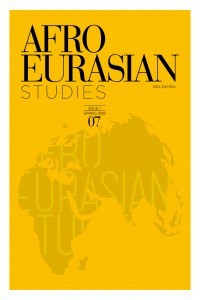
Afro Eurasian Studies
Yazarlar: Hussein SOLOMON
Konular:-
Anahtar Kelimeler:Africa,Al Shabab,Post-9/11 counterterrorism strategies,Radical Islam,Somalia,Terrorism,Weak states
Özet: Despite terrorism’s long history, there is still today no consistent or widely agreed upon definition of either what constitutes terrorism or who the terrorist is. Africa’s strategic significance in the “war on terrorism” grew post-9/11 along with acceptance of the idea that weak and failing states pose a threat to international security by providing an ideal environment for terrorism, and in particular, for the rise of radical Islam.. Somalia is often cited as the paradigm of a weak state, and the post-9/11 counterterrorism discourses propose that the promotion of democracy and good governance will provide the most effective strategy to counter Somalia’s al Shabab. This article aims to discuss the post-9/11 strategic challenge of Somalia’s al Shabab in the context of histories and spaces of terror in Africa